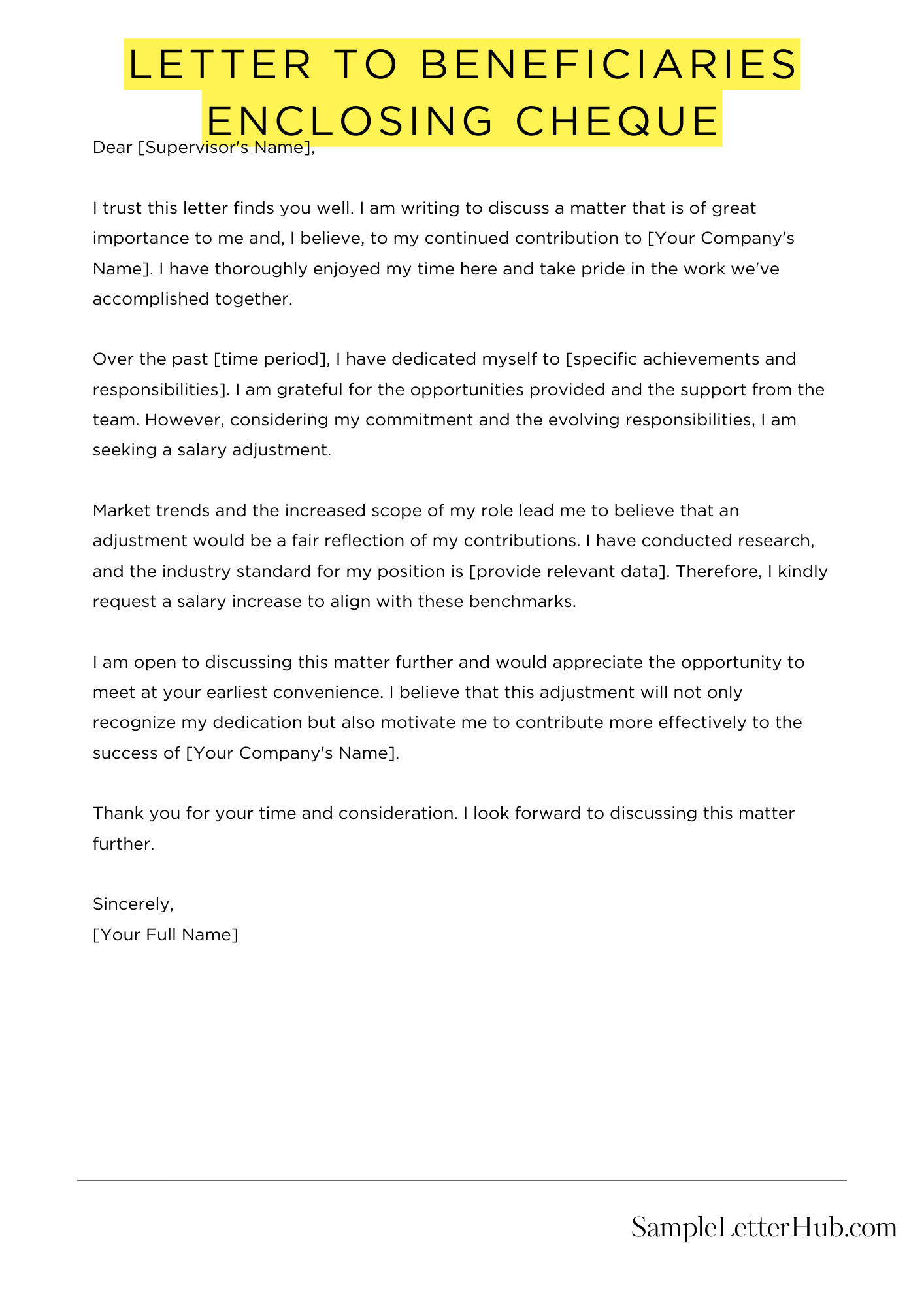A Letter To Beneficiaries Enclosing Cheque is a formal document sent to beneficiaries to inform them about their inheritance and to enclose a cheque for their share of the estate. It is typically written by the executor of the will or the administrator of the estate.
In this article, we will share templates, examples, and samples of Letter To Beneficiaries Enclosing Cheque. These templates and samples will provide you with a starting point for writing your own letter. They will also help you to ensure that your letter is clear, concise, and professional.
Letter to Beneficiaries Enclosing Cheque
Dear [Beneficiary Name],
I am writing to inform you that you are a designated beneficiary of [Deceased’s Name] and have been entitled to receive a sum of money as part of the estate settlement.
Enclosed you will find a cheque in the amount of [insert amount] made payable to you. This is your share of the funds from the estate.
We understand this may be a difficult time for you, but we hope that this cheque will provide some financial support during this period of transition. Please feel free to reach out to us with any questions or concerns you may have.
We hope that this contribution can be of assistance to you and your loved ones. Please accept our sincere condolences during this trying time.
Sincerely,
[Your Name]

How to Write Letter To Beneficiaries Enclosing Cheque
Writing a letter to beneficiaries enclosing a cheque can be a daunting task, but it is important to do it correctly to ensure that the beneficiaries receive their inheritance in a timely and efficient manner.
1. Start with a Formal Salutation
Begin your letter with a formal salutation, such as “Dear [Beneficiary’s Name]”.
2. State the Purpose of the Letter
In the first paragraph, clearly state the purpose of the letter, which is to inform the beneficiary that they are receiving an inheritance and to enclose a cheque for the amount of their inheritance.
3. Provide Details of the Inheritance
In the second paragraph, provide details of the inheritance, including the amount of the inheritance, the date of the inheritance, and the name of the deceased person who left the inheritance.
4. Enclose the Cheque
In the third paragraph, state that you are enclosing a cheque for the amount of the inheritance. Be sure to include the cheque number and the date of the cheque.
5. Provide Instructions for Cashing the Cheque
In the fourth paragraph, provide instructions for cashing the cheque. This may include information on where to cash the cheque, what identification is required, and any other relevant information.
6. Express Condolences (Optional)
If the inheritance is from a deceased person, you may want to express your condolences to the beneficiary in the fifth paragraph. This is a thoughtful gesture that can help the beneficiary cope with their loss.
7. Close with a Formal Valediction
End your letter with a formal valediction, such as “Sincerely” or “Respectfully”.
FAQs about Letter To Beneficiaries Enclosing Cheque
What should be included in a letter to beneficiaries enclosing a cheque?
The letter should include the following information:
- The name of the deceased
- The date of death
- The amount of the cheque
- The reason for the payment
- Any instructions for cashing the cheque
- A statement of sympathy
How should the letter be written?
The letter should be written in a formal and respectful tone. It should be clear and concise, and it should avoid using any jargon or technical terms. The letter should be signed by the executor of the estate.
When should the letter be sent?
The letter should be sent as soon as possible after the cheque has been issued. This will help to ensure that the beneficiaries receive the payment promptly.
What if the beneficiary does not cash the cheque?
If the beneficiary does not cash the cheque within a reasonable amount of time, the executor of the estate should contact them to find out why. The executor may need to take steps to reissue the cheque or to make other arrangements for payment.
What if the cheque is lost or stolen?
If the cheque is lost or stolen, the executor of the estate should contact the bank to cancel the cheque and issue a new one. The executor may also need to file a police report.

